- Home
- Patrick Ness
Burn Page 5
Burn Read online
Page 5
“How long?”
“Until I was nearly thirty.”
Dernovich wouldn’t have guessed she was much older than thirty now. He was on the verge of asking when she answered. “Thirty-four,” she said. “But I was on my way out of it for many years before then.”
“The journey out isn’t years long,” he said. “You just leave.”
“Spoken like someone with opinions on the subject but no actual experience.”
His face got hot. “Not the way you want to be speaking to a senior agent, Woolf.”
She shrugged, as if it were nothing. “I was merely being factual. That’s our job, isn’t it?”
“Our job is to ascertain if there is an assassin—”
“There is. We know the runes they’re reading from.”
“Find him—”
“Or her. It’s likely to be—”
“And stop him.”
She finally seemed a little piqued. “Shall we just arrest every Believer we see? Like this boy?”
“Of course not,” Dernovich said, so firmly that it shut off all the ambiguity he’d felt when he’d first seen the boy. And “boy” was right. He couldn’t be more than seventeen, disappearing into the trees that lined the river, probably to smoke, or whatever Believer teens did to rebel. Not a chance he was the one they were looking for, and they needed to find that person, as soon as possible. It had all suddenly gotten very serious.
Obscured as it was by the shock of finding out Woolf had once been a Believer, Agent Dernovich would only remember this mistake when it was far too late.
Malcolm walked along the riverbank. He had not had to kill anyone, which, despite all he’d been taught, was a relief that nearly made him dizzy again. All in all, a success.
“Thank you,” he remembered to whisper as he walked.
His ear felt better, too, and the day, though still bitterly cold, was shaping up to remain clear. He had no doubts. His fears had lessened. The FBI agents who were hunting him, had they but known, had he but known, were receding behind him.
The border would only grow closer.
So would his target.
And when Malcolm—or whatever he was calling himself by that point—crossed the border, walked a further two hundred miles and found that target.
Well, then. What a day that would be.
He picked up his step and moved on.
Five
SARAH LOOKED UP Kazimir’s name in the decaying encyclopedias in her school library. “Someone famous for his prowess in battle,” the book said, confirming Kazimir’s own explanation, but it also meant “destroyer of peace” as well as, in that way that language was so often unhelpful, “bringer of peace.”
“How did he know your name, though?” Jason asked as she put the J–K volume back on the dusty, dusty shelf.
“Maybe he heard my dad say it?” They both knew how unlikely this was, given how careful Gareth Dewhurst was around a dragon. Around anyone.
“They’re inscrutable. Always have been.”
“And you’re a vocabularian,” she said back. “Always have been.”
“It’s a really ace name,” Jason continued. “I’d probably get picked on less if I was named Kazimir.”
“You don’t really think that.”
“I don’t, no.”
In truth, neither of them was so much picked on at school as effectively invisible. Even Kelby’s anti-Japanese feelings now felt out of date, what with all the newspaper headlines screaming about the Soviets.
“Did you see today’s?” asked Miss Archer, coming over to them. She was their kind, young librarian who preferred the word “bachelorette” over “spinster.”
“Are they going to nuke us into oblivion?” Jason asked, as he gathered his things to go. He had his part-time job tonight, Sarah knew, at Al’s, Frome’s one and only diner, run by Albert, whose real name was Noriyuki, but Sarah only knew that because Jason had told her.
“They wouldn’t,” Sarah said, meaning the Soviets, though who knew, really? She scanned the paper. It was full of photographs of the USSR testing new launch equipment, deep inside the boundaries of that mysterious, closed country. The Soviets still had the U.S. spy they’d caught, maybe he was even the one who took these pictures.
“They’ve got something planned,” Miss Archer said. “Most likely the space race. Everyone wants to be the first ones in orbit or on the moon.”
“And they can bomb us from there,” Jason said.
“Not necessarily,” Sarah said. “Space could be hopeful, couldn’t it? A place where maybe it doesn’t matter if you’re American or Russian.”
“Or dragon,” Jason added.
“You think they want to go into space?”
“Who knows what they want?” Miss Archer said, but her friendly smile also contained a pointed invitation to gossip aimed directly at Sarah.
“Does everyone know?” Sarah asked.
“Frome isn’t that big,” Miss Archer said.
“Unfortunately,” Jason said.
“Is it going to be a problem that our dragon is blue?”
“Is he actually Russian?” Miss Archer asked. “Does he speak to you? What’s his accent like?”
“He sounds like a dragon. They don’t really have countries, do they? Except the Wastes? Even if we call them Russian or Canadian. Besides, it seems like he’s been here long enough to just be American.”
“That argument didn’t work for my parents,” Jason said.
Sarah frowned. “Do you really think there could be trouble?”
“I always think there could be trouble,” Miss Archer said. “That way I’m never surprised.”
“That’s probably less of a comfort than you think,” Sarah said.
“But you know how people are,” Sarah said to her father over dinner. It was little more than simmering stew and cornmeal, but at least it was warm. “If they think he’s actually Russian—”
“Stop concerning yourself with that dragon,” her father said, not looking up from the Tacoma News Tribune and Herald, the same one she’d seen at school.
“I just don’t want people giving you trouble because we hired—”
“You don’t need to concern yourself with my trouble either. I will handle the claw.”
“They don’t like that,” she said. “When you call them that.” He glanced at her over the corner of his paper. “Well, they don’t. It’s not a nice word.”
“What do you think they call us?”
“He’s only said human or mammal.”
“And that doesn’t strike you as insulting?”
“I’m just saying—”
“They don’t need you to defend them.” His voice was harder now, stern. “They weigh seventy tons. They can fly and breathe fire. They are, in fact, dragons, Sarah. Soulless animals. They don’t have feelings to hurt any more than a wolf who would eat you for his breakfast.” He made an annoyed flick of the newspaper and went back to reading it. “Just because the devil gave them the gift of speech doesn’t mean you’re talking to anything more than a mostly undomesticated predator.”
“The devil?”
“It’s just a saying.”
“An old one. An ugly one.”
“Sarah—”
“People called Mom names, too. And you for marrying her.”
There was a silence behind the newspaper, a stillness that did nothing for Sarah’s anxiety. She didn’t know why she was poking so much. The oddity of her father hiring a creature he so clearly mistrusted was hard to square, especially from a man she knew to be difficult but not hateful. He’d nursed her mother without complaint through the tumor that had devoured her stomach less than two months after first diagnosis, bringing an end to a marriage that had been happy but had never, not once, been easy.
Washington wasn’t the South or their neighbor Idaho, where marriage between whites and blacks was still illegal. It wasn’t even Oregon, which hadn’t repealed its laws against interracial ma
rriage until just six years ago. Washington had done it in 1868, the sixth of the forty-eight states to do so (so early, in fact, it hadn’t even been a state yet). This was a forward-looking place. But that hadn’t stopped the looks. The messages left in their mailbox that a younger Sarah occasionally found. Hadn’t stopped the surprising resistance Sarah herself had occasionally even faced at the beauty salon her mother had taken her to in Tacoma to “properly learn how to manage that hair of yours.” The roomful of laughing women, their skin matching the dark of Sarah’s mother, coming to an uncomfortable silence once Darlene and Sarah arrived. It picked up again, almost immediately, but that pause was there.
Come to think of it, maybe her father’s anger wasn’t so surprising after all. Maybe it was the natural outlet for a man who’d married for a love that cost him and then was taken—
“If you think what people called me and your mother is anything like the same as what I call a dragon,” he said now, too quietly for comfort, “then I don’t know what to say to you, daughter.”
He went to bed shortly thereafter, directing not another word at her, as if he really didn’t know what to say. She lay awake long after she knew him to be asleep. She was troubled, to be sure, but that wasn’t why she’d resisted sleeping.
Tonight was the night Jason closed up the diner for Al, and for half an hour or forty-five minutes, the diner was the one place on earth where she and Jason could ever be properly alone.
Deputy Emmett Kelby was a stupid man. He knew it, which was bad enough, but he knew everyone else knew it, too. He’d never make it past deputy, that much was clear. Even if Sheriff Lopez moved on—and don’t think that last name didn’t bother Kelby on a daily basis—and the entire rest of the Pierce County Sheriff Department were somehow razed to the ground, he’d somehow still be Deputy Kelby until the day he died.
But though he may have been stupid—and, it can’t be overemphasized, he was—he was very, very cunning. He knew exactly how much he could get away with and exactly how those limits changed with the person who was its unfortunate recipient. He knew which neighborhoods he could drive through in Frome to harass residents who would never call his boss to report him. He knew which ones he could stop for a busted taillight—that was, of course, working perfectly until Deputy Kelby put his baton through it—and who’d never officially complain, even when he did it again a month after they’d had it fixed.
He was the thing the world had suffered from most in her four billion years of existence: a stupid man with power. When the lights of the universe went out one day, standing over the plug, having pulled it despite all warnings, would be a man like Deputy Kelby, defiant in refusing to believe the advice of anything but his own sheer dumbness.
Like many stupid but cunning men with power, he also never forgot a slight.
That dragon. That blue dragon. That Russian dragon had slighted him. He would find a way to make it pay. But that wasn’t today. Today was for one Jason Inagawa. Hadn’t we just fought a war and won? And here was someone like Jason—there he was now, look at him, busing crates of return bottles out of the back of the diner—at a job that should rightfully have gone to a proper American teenager.
Deputy Kelby pulled a drag on his cigarette so hard and long he burnt his lip. Cursing, he flung it out the window he’d cracked on this stakeout. Because yes, he was staking out Jason Inagawa, who wouldn’t forget the rest of this night in a hurry. Nosiree, when the last lights went out and Jason Inagawa started the long walk home, something was going to happen that would make sure he never forgot the name Emmett John Kel—
He sat up straight in his seat. Were his eyes deceiving him or was that Sarah Dewhurst sidling out of the shadows and knocking on the back door of Al’s, not seeing Kelby’s cruiser in the dark? And here was Jason Inagawa opening the door for her, greeting her only with a nod as she followed him inside.
Deputy Kelby smiled. It was a stupid smile. It was a cunning smile.
This was going to be even more fun than he thought.
“Stop,” Jason said.
“What’s wrong?” she asked, pulling away from the kiss.
“I’m sorry,” he said. “I’m being a real sad sack tonight.”
She moved over next to him. “A little bit. But so what?” She looked around Al’s cold and dingy office. “This is a sad sack kind of place.”
“I just . . .” he said. “I’m angry.”
“At me?”
“No, just angry. But I realized today that I feel it all the time.” He turned to her. “All the time.”
She didn’t answer him, but of course she knew what he meant. Every day in a town with people who didn’t look like you, in a life that didn’t look like you, it eventually just wore you out. Like even today, she got strange looks in all her classes, and Velma Doone accused her straight out of having a dad who was spying for the Russians. What would he spy on in Frome? On a farm? That Velma Doone was a stupid person who would never transcend her name was beside the point. She knew what Jason meant. But what could they possibly do about it?
“Is it Kelby?” she asked anyway.
“I guess. I mean, he’s just the top of a long list.”
“My mom always said that dragons weren’t just out there in the world. That if you cut some people open, they’d have dragon right below the surface. An angry one, trying to get out.”
Jason leaned all the way forward, almost until his forehead touched his knees. “My father wants to send me away.”
Sarah sat up. “He what?”
“He’s found some prep school in Minnesota run by a Japanese guy. Says it’s the best way to get me into the right college.”
“When would this be?”
“Summer and then all of senior year.”
They sat in silence. There wasn’t a chance Sarah was going to be able to afford college. Her grades were good enough to get in somewhere, but probably not good enough to get the scholarships she’d need to even come close to paying for it. But Hisao Inagawa wanted his son to not just succeed but thrive and, Sarah and Jason guessed, conquer the exact types of people who forced his mother to die in an internment camp. Even working at this diner while still having all the chores of any teenager living on a farm was practice to get Jason working harder than everyone else.
Sarah knew—had always known—that she didn’t fit into his future. But then, she had sort of given up on the future when her mother died. You just got days, it seemed to her, where stuff happened or it didn’t, where planning just showed you what a fool you were to think you had any say over what your life would be. If Jason left in the summer, well, it was going to happen whatever her ache about it might be.
She could already feel that ache beginning.
“Don’t you ever want to go on a real date?” Jason said now, clearly feeling it, too.
“Of course,” she said. “Why wouldn’t I?”
He looked at her, surprised. “I thought you wanted to keep this secret.”
“I thought you wanted to keep this secret.”
He was shocked for a moment, then laughed. “How stupid are we?”
“I don’t think my dad would complain. He likes your dad.”
“No one likes my dad. They tolerate him.”
“My dad respects him.”
“Does he?”
Sarah shrugged. “He never talks bad about him.”
“Which for this town is something like respect, I guess.”
“I always thought it was your dad who’d have a problem.”
“He would. A big one.”
“Well, there you go. That’s why we keep it a secret.”
“But why should my dad having a problem be something that stops us?”
“Because we’re young. Because he runs your house. Because he’s got the power to send you to prep school.”
“You haven’t said you’ll miss me.”
“You haven’t said you’ll miss me.”
He sighed slow and long. She was surpri
sed to see he was holding back tears. She moved into the space under his arm. The smell of him now wasn’t exactly nice—it was sweat and hamburger grease and whatever it was beneath that was Jason’s own individual smell—but she liked it. It was a place to rest. Safely.
Plus, he could kiss her—as he did now—with a softness that made her toes wriggle.
“Don’t you feel like there’s two reasons to keep a secret?” she said. “Because on the one hand, it would get you into trouble. But on the other, if it’s secret, it’s valuable. It belongs to you and not anyone else.”
“So you want to keep this a secret still?”
“Want? I want a world where my mother is alive and where we’re not going to lose our farm and where nuclear war isn’t a daily threat and where no one will hold us down because of the color of our skin or because we’re so poor we had to hire a dragon. That’s what I want.”
He sniffed. “Point taken.”
She moved out from under his arm, missed it, but started buttoning up her coat anyway. “Plus, dating is one thing, but neither of our fathers would have anything positive to say about us meeting like this.”
“My father would kill me.”
“Oh, you,” she said, a bitterness in her voice that surprised her. “I’d be ruined. The town harlot. You’d just be—”
“Regularly beaten up by local police officers?”
She looked at him. At his short hair, cut brutally up the sides, at the lanky arms, at the few hairs that sprouted where a moustache might theoretically be. He was right. She was right. And there was nothing either of them could do about it.
“Secret because it’s valuable,” he said.
She let her silence be a yes, then she said, “We should get going.”
She opened the back door of the office, the one that led into the small alley behind Al’s where the dumpsters were, where there was only a distant streetlight to cast any illumination.
It was still enough to see Deputy Kelby waiting there for her, his police baton out, and a smile on his face that would haunt Sarah Dewhurst for the rest of her life.
“Slut,” he said. His first word. A word that told her everything she needed to know about how this was going to go.

 The Rest of Us Just Live Here
The Rest of Us Just Live Here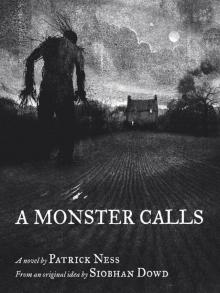 A Monster Calls
A Monster Calls The Crane Wife
The Crane Wife Release
Release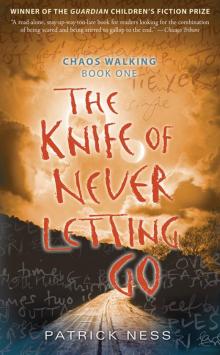 The Knife of Never Letting Go
The Knife of Never Letting Go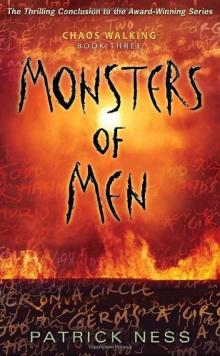 Monsters of Men
Monsters of Men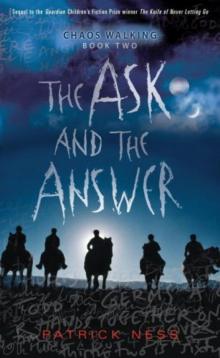 The Ask and the Answer
The Ask and the Answer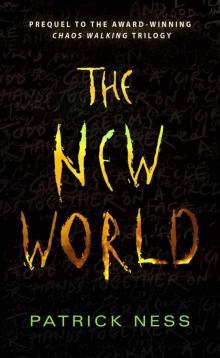 The New World
The New World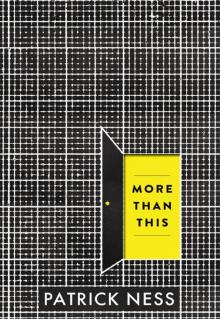 More Than This
More Than This Burn
Burn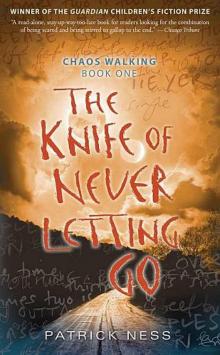 The Knife of Never Letting Go cw-1
The Knife of Never Letting Go cw-1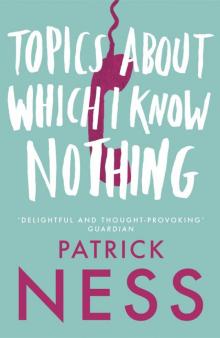 Topics About Which I Know Nothing
Topics About Which I Know Nothing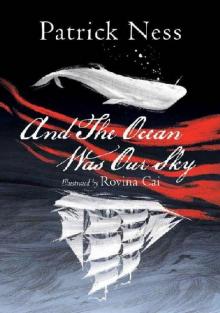 And The Ocean Was Our Sky
And The Ocean Was Our Sky The Stone House
The Stone House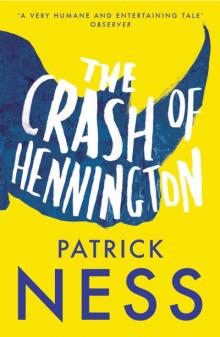 The Crash of Hennington
The Crash of Hennington Joyride
Joyride What She Does Next Will Astound You
What She Does Next Will Astound You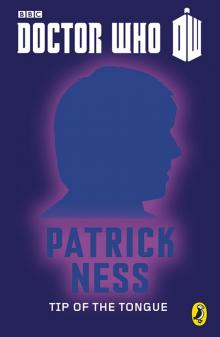 Tip Of The Tongue
Tip Of The Tongue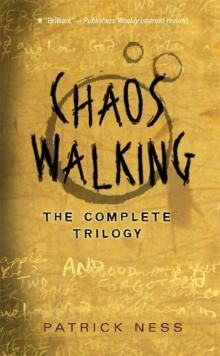 Chaos Walking
Chaos Walking